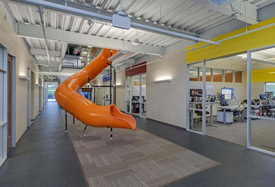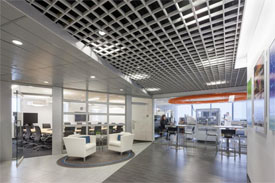
Credit: Bisnow
Open space vs. Private offices – what is your position? Are we, as a workforce, moving away from open plans to the more traditional office? Perhaps our private offices are smaller and more efficient? Is this the end of the ‘Creative Office’ as Bisnow describes:
Dot-com companies in the early ’90s struck gold when they put all their employees in a single room (or more often, garage). Since, the open concept plan has widely replaced office-lined perimeters for execs and a bullpen center for support staff, as furniture vendors continued to develop solutions that aligned with those times. And while some industries (tech, creative, communications) adapted more willingly than others (legal, financial), the design world embraced the idea that humans as social animals needed areas to congregate, collaborate and socialize…And from the open office came the creative office. You know the one…it usually has a slide (like HCSS’s Sugar Land office above), or a gourmet coffee bar with lounge area made from reclaimed wood. Elfreda says open office and creative office are similar, but the creative office is definitely an evolution of the former.
You can read Bisnow’s full article on the evolving office trends, here.

